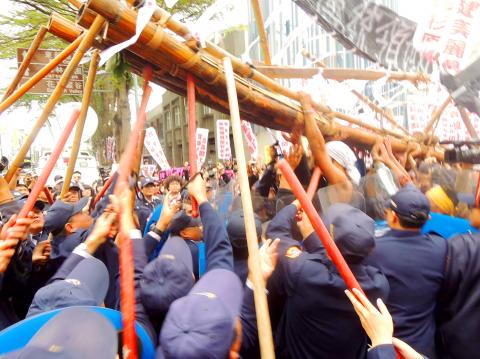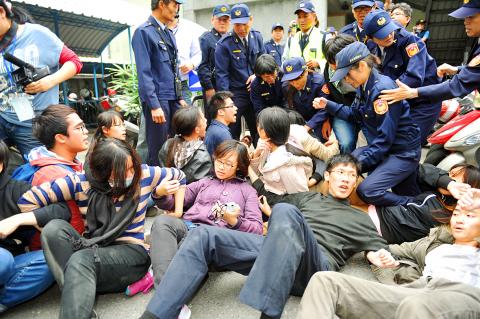The controversial construction of Miramar Resort Village at Taitung County’s Shanyuan Bay (杉原灣) gained conditional approval from a seventh Environmental Impact Assessment (EIA) meeting yesterday, despite heated debate over the legitimacy of the project and the EIA meeting.
The joint build-operate-transfer project by the developer and the county government began construction in 2004.
The main building was built on a less than 1 hectare area by the beach, to avoid the EIA required for construction projects on land of more than 1 hectares.

Photo: Huang Chih-yuan, Taipei Times
The project later gained conditional approval from an EIA meeting at the local government for a total area of 6 hectares in 2008.
The project has sparked protests and lawsuits by environmentalists and local residents, and the Supreme Administrative Court in January made a final verdict ruling the project’s EIA conclusion invalid.
It reached another final verdict in September ordering the project to stop construction.

Photo: Huang Chih-yuan, Taipei Times
However, the Taitung County Government and the developer insisted the project was still legal and that it only needed to redo the EIA process and gain approval to proceed with its construction and operation plans.
Yesterday’s EIA meeting was held at the Taitung County Government, with hundreds of proponents and opponents of the project gathered outside the meeting venue.
Holding banners and calling on the protesters not to interfere with the meeting, local supporters and the Taitung Tourism Association shouted that the hotel would bring job opportunities.
Also holding up banners, people against the project questioned the legitimacy of redoing an EIA, saying it should be based on “precautionary principles” when the damage from the construction had already been done and that the EIA committee members were mostly from environmental engineering backgrounds, lacking expertise in the marine ecology, social and cultural aspects of the issue.
Meanwhile, more than 100 police were deployed outside the venue to prevent clashes between the different groups.
Police dragged several protesters along the ground or held them back with force to prevent them from entering the meeting.
The meeting convener — Taitung County Environmental Protection Bureau director Huang Ming-en (黃明恩) — led the committee members to another room for final discussions and refused to allow the media to enter the venue.
Following a closed-door meeting that lasted about half an hour, Huang announced that the project had been conditionally approved. Details of the conditions were not explained.
Shouting: “Illegal EIA meeting with invalid conclusion,” protesters said the EIA meeting yesterday was illegal and flawed and that as such, the meeting’s conclusion may be ruled invalid in court in the future.

DAREDEVIL: Honnold said it had always been a dream of his to climb Taipei 101, while a Netflix producer said the skyscraper was ‘a real icon of this country’ US climber Alex Honnold yesterday took on Taiwan’s tallest building, becoming the first person to scale Taipei 101 without a rope, harness or safety net. Hundreds of spectators gathered at the base of the 101-story skyscraper to watch Honnold, 40, embark on his daredevil feat, which was also broadcast live on Netflix. Dressed in a red T-shirt and yellow custom-made climbing shoes, Honnold swiftly moved up the southeast face of the glass and steel building. At one point, he stepped onto a platform midway up to wave down at fans and onlookers who were taking photos. People watching from inside

A Vietnamese migrant worker yesterday won NT$12 million (US$379,627) on a Lunar New Year scratch card in Kaohsiung as part of Taiwan Lottery Co’s (台灣彩券) “NT$12 Million Grand Fortune” (1200萬大吉利) game. The man was the first top-prize winner of the new game launched on Jan. 6 to mark the Lunar New Year. Three Vietnamese migrant workers visited a Taiwan Lottery shop on Xinyue Street in Kaohsiung’s Gangshan District (崗山), a store representative said. The player bought multiple tickets and, after winning nothing, held the final lottery ticket in one hand and rubbed the store’s statue of the Maitreya Buddha’s belly with the other,

‘NATO-PLUS’: ‘Our strategic partners in the Indo-Pacific are facing increasing aggression by the Chinese Communist Party,’ US Representative Rob Wittman said The US House of Representatives on Monday released its version of the Consolidated Appropriations Act, which includes US$1.15 billion to support security cooperation with Taiwan. The omnibus act, covering US$1.2 trillion of spending, allocates US$1 billion for the Taiwan Security Cooperation Initiative, as well as US$150 million for the replacement of defense articles and reimbursement of defense services provided to Taiwan. The fund allocations were based on the US National Defense Authorization Act for fiscal 2026 that was passed by the US Congress last month and authorized up to US$1 billion to the US Defense Security Cooperation Agency in support of the

‘COMMITTED TO DETERRENCE’: Washington would stand by its allies, but it can only help as much as countries help themselves, Raymond Greene said The US is committed to deterrence in the first island chain, but it should not bear the burden alone, as “freedom is not free,” American Institute in Taiwan Director Raymond Greene said in a speech at the Institute for National Defense and Security Research’s “Strengthening Resilience: Defense as the Engine of Development” seminar in Taipei yesterday. In the speech, titled “Investing Together and a Secure and Prosperous Future,” Greene highlighted the contributions of US President Donald Trump’s administration to Taiwan’s defense efforts, including the establishment of supply chains for drones and autonomous systems, offers of security assistance and the expansion of